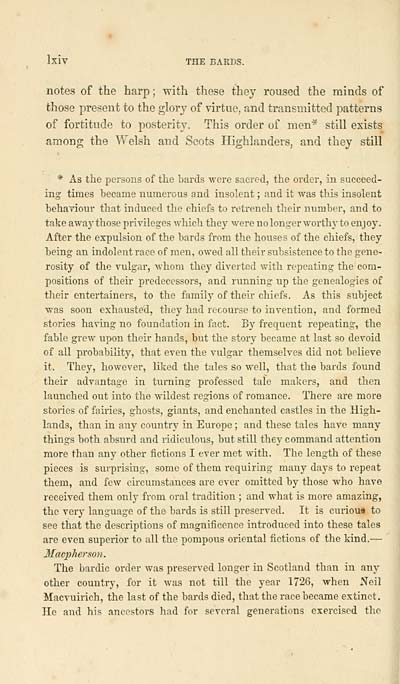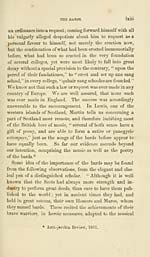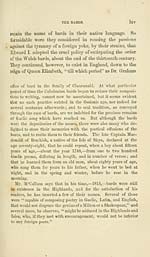Download files
Complete book:
Individual page:
Thumbnail gallery: Grid view | List view

Ixiv THE BARDS.
notes of the harp ; with these they roused the minds of
those present to the glorj of virtue, and transmitted patterns
of fortitude to posterity. This order of men* still exists
among the Welsh and Scots Highlanders, and they still
* As the persons of tlie bards were sacred, the order, iu succeed-
ing times became numerous and insolent ; and it was this insolent
behariour that induced the chiefs to retrench their number, and to
take away those privileges which they were no longer worthy to enjoy.
After the expulsion of the bards from the houses of the chiefs, they
being an indolent race of men, owed all their subsistence to the gene-
rosity of the vulgar, Mhom they diverted with repeating the com-
positions of their predecessors, and running up the genealogies of
their entertainers, to the family of their chiefs. As this subject
was soon exhausted, they had recourse to invention, and formed
stories having no foundation in fact. By frequent repeating, the
fable grew upon their hands, but the story became at last so devoid
of all probability, that even the vulgar themselves did not believe
it. They, however, liked the tales so well, that the bards found
their advantage in turning professed tale makers, and then
launched out into the wildest regions of romance. There are more
stories of fairies, ghosts, giants, and enchanted castles in the High-
lands, than in any country in Europe ; and these tales have many
things both absurd and ridiculous, but still they command attention
more than any other fictions I ever met with. The length of these
pieces is surprising, some of them requiring many days to repeat
them, and few circumstances are ever omitted by those who have
received them onlj' from oral tradition ; and what is more amazing,
the very language of the bards is still preserved. It is curioua to
see that the descriptions of magnificence introduced into these tales
are even superior to all the pompous oriental fictions of the kind. —
Macpherson.
The bardic order was preserved longer in Scotland than iu any
other country, for it was not till the year 1726, when Neil
Macvuirich, the last of the bards died, that the race became extinct.
He and his ancestors had for several generations exercised the
notes of the harp ; with these they roused the minds of
those present to the glorj of virtue, and transmitted patterns
of fortitude to posterity. This order of men* still exists
among the Welsh and Scots Highlanders, and they still
* As the persons of tlie bards were sacred, the order, iu succeed-
ing times became numerous and insolent ; and it was this insolent
behariour that induced the chiefs to retrench their number, and to
take away those privileges which they were no longer worthy to enjoy.
After the expulsion of the bards from the houses of the chiefs, they
being an indolent race of men, owed all their subsistence to the gene-
rosity of the vulgar, Mhom they diverted with repeating the com-
positions of their predecessors, and running up the genealogies of
their entertainers, to the family of their chiefs. As this subject
was soon exhausted, they had recourse to invention, and formed
stories having no foundation in fact. By frequent repeating, the
fable grew upon their hands, but the story became at last so devoid
of all probability, that even the vulgar themselves did not believe
it. They, however, liked the tales so well, that the bards found
their advantage in turning professed tale makers, and then
launched out into the wildest regions of romance. There are more
stories of fairies, ghosts, giants, and enchanted castles in the High-
lands, than in any country in Europe ; and these tales have many
things both absurd and ridiculous, but still they command attention
more than any other fictions I ever met with. The length of these
pieces is surprising, some of them requiring many days to repeat
them, and few circumstances are ever omitted by those who have
received them onlj' from oral tradition ; and what is more amazing,
the very language of the bards is still preserved. It is curioua to
see that the descriptions of magnificence introduced into these tales
are even superior to all the pompous oriental fictions of the kind. —
Macpherson.
The bardic order was preserved longer in Scotland than iu any
other country, for it was not till the year 1726, when Neil
Macvuirich, the last of the bards died, that the race became extinct.
He and his ancestors had for several generations exercised the
Set display mode to: Large image | Transcription
Images and transcriptions on this page, including medium image downloads, may be used under the Creative Commons Attribution 4.0 International Licence unless otherwise stated. ![]()
| Early Gaelic Book Collections > Ossian Collection > Ossian, his principal poems > (68) |
|---|
| Permanent URL | https://digital.nls.uk/82621717 |
|---|
| Description | Selected books from the Ossian Collection of 327 volumes, originally assembled by J. Norman Methven of Perth. Different editions and translations of James MacPherson's epic poem 'Ossian', some with a map of the 'Kingdom of Connor'. Also secondary material relating to Ossianic poetry and the Ossian controversy. |
|---|
| Description | Selected items from five 'Special and Named Printed Collections'. Includes books in Gaelic and other Celtic languages, works about the Gaels, their languages, literature, culture and history. |
|---|

